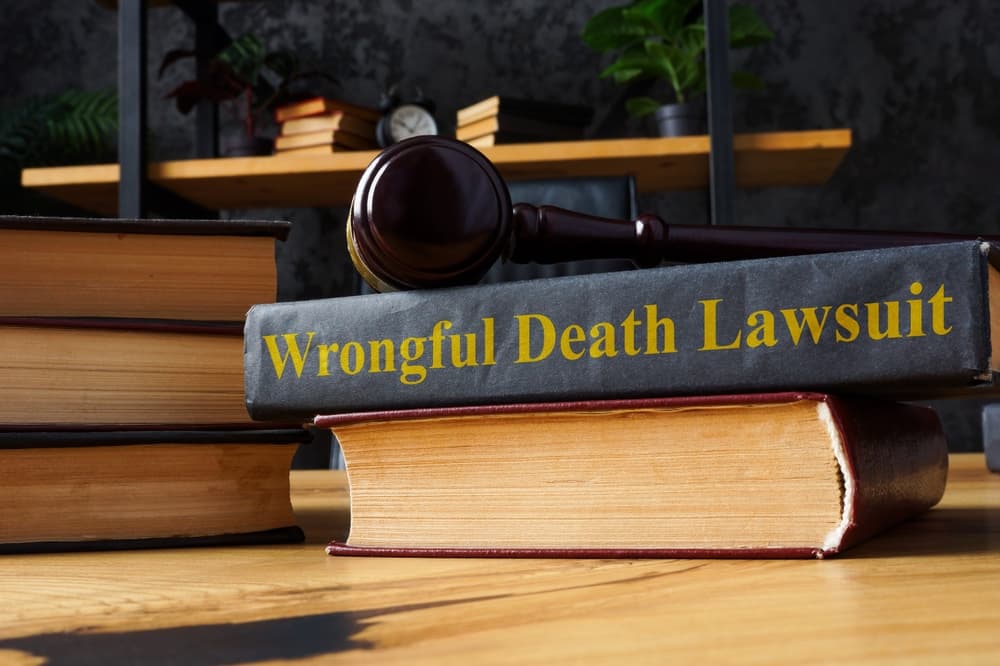In one recent year, more than 224,000 Americans died from preventable injuries—a staggering number driven by motor vehicle crashes, falls, and other fatal incidents, according to the National Safety Council.
Behind each statistic is a family suddenly facing an unexpected and unimaginable loss, all too often caused by someone else’s carelessness or misconduct. When that happens, the law allows certain individuals to pursue justice through a civil claim. But who can file a wrongful death suit?
Many people assume the closest family member is automatically allowed to sue. In reality, the process is more complicated. In Indiana and many other states, the law requires a specific legal representative, usually appointed by a probate court, to file the claim.
If you’re grieving and unsure whether you have legal standing, a wrongful death lawyer can help you understand your rights and the next steps.
Key Takeaways for Who Can Sue for Wrongful Death?
- Wrongful death claims are legal actions that allow survivors to seek compensation after a loved one dies due to someone else’s negligence.
- In most states, including Indiana, these lawsuits must be filed by a personal representative of the deceased’s estate.
- Eligibility to recover damages depends on your relationship to the deceased and whether the person left a will or estate plan.
- Legal deadlines are strict. In Indiana, wrongful death lawsuits generally must be filed within two years of the date of death.
- A wrongful death attorney can help determine your eligibility and manage the entire legal process while you focus on grieving and healing.
What Is a Wrongful Death Lawsuit?
 A wrongful death lawsuit is a civil claim brought when someone dies due to another person’s careless, reckless, or intentional actions. These claims often follow fatal car accidents, construction incidents, medical mistakes, or acts of violence. The goal is to recover financial compensation for losses such as funeral costs, lost wages, and emotional suffering.
A wrongful death lawsuit is a civil claim brought when someone dies due to another person’s careless, reckless, or intentional actions. These claims often follow fatal car accidents, construction incidents, medical mistakes, or acts of violence. The goal is to recover financial compensation for losses such as funeral costs, lost wages, and emotional suffering.
Indiana statutes that define wrongful death
Every state has wrongful death laws that define who may file a claim and what damages can be recovered. In Indiana, the legal basis is found in Indiana Code § 34-23-1, which governs general wrongful death claims, and Indiana Code § 34-23-2 for wrongful deaths involving children.
Civil vs. criminal wrongful death cases
A wrongful death lawsuit is different from a criminal case. Criminal charges may be filed by the government against the person responsible, but a wrongful death suit is filed by the decedent’s estate to seek financial recovery for the family.
While the two processes can happen at the same time, they serve different purposes. Criminal cases focus on punishing the wrongdoer through jail time or fines. Civil cases focus on the impact on the surviving family, helping them recover financially and emotionally. Even if there is no criminal conviction, you may still be able to pursue a wrongful death claim and hold the responsible party accountable in civil court.
Who Has Legal Rights in a Wrongful Death Lawsuit?
Losing someone to negligence or carelessness is devastating, and figuring out who has the legal right to act on their behalf often adds confusion to grief. In Indiana, wrongful death law separates two roles: the person who files the claim and the people who may receive compensation. Knowing what that distinction involves is key to moving forward.
Who files the claim in Indiana?
Only one person is allowed to file a wrongful death lawsuit in Indiana: the personal representative of the deceased person’s estate. This individual manages the case on behalf of all surviving beneficiaries. If the deceased left a will, that representative is often named there. If there is no will, the probate court appoints someone—typically a surviving spouse, adult child, or parent.
This legal structure helps centralize the process and ensures that just one claim is filed per incident. It also protects against multiple family members filing competing lawsuits. The representative’s role is not to claim all the money for themselves, but to oversee the legal action for everyone who qualifies under state law.
Who receives compensation?
Indiana law recognizes that many people suffer losses after a wrongful death, but it limits who can receive compensation to certain family members and dependents. These typically include:
- Spouses and dependent children, who may recover for lost income, support, and companionship
- Parents of a deceased child, especially if the child was under 20 or still in school
- Other relatives, such as adult children or siblings, if no closer heirs exist
The money awarded through a settlement or verdict is not automatically split evenly. Distribution depends on several factors, including the type of damages awarded, whether there’s a will, and the court’s determination of each person’s loss. For example, a spouse who relied on the deceased for income may receive more than an adult child who lived independently.
What if there’s no will or estate plan?
When someone dies without a will (known as dying intestate), the court appoints a personal representative. Indiana’s intestate succession laws also guide how compensation is divided. Typically, the closest surviving relatives (spouse, children, or parents) receive priority.
If no immediate family exists, the court may recognize next of kin. However, people not legally related, such as fiancés, long-term partners, or close friends, generally cannot file a claim or receive compensation, no matter how deep the emotional bond.
Can multiple people file a wrongful death lawsuit?
No. Indiana law allows only one wrongful death claim per deceased individual. However, multiple family members can still be part of the case by receiving compensation through the estate. If disputes arise, such as disagreements over who should be the representative or how the money should be divided, the probate court will step in to resolve them.
This system may seem formal or impersonal, but it’s designed to protect families from prolonged legal battles and ensure fairness. A wrongful death lawyer can help the representative navigate the process and make sure every eligible beneficiary is accounted for.
In some situations, especially when there’s no will, disputes can arise over who qualifies as a wrongful death beneficiary. In those cases, the probate court may need to resolve how the compensation is divided.
What Types of Compensation Can Be Recovered?
Wrongful death claims aren’t only about financial support. They also acknowledge the personal losses that families experience after a tragic death. Indiana law allows recovery for both economic and non-economic damages, including:
- Medical bills related to the fatal injury
- Funeral and burial expenses
- Lost income and benefits the deceased would have provided
- Loss of companionship, care, and guidance
- Mental anguish and emotional suffering
Certain damages may be capped depending on the circumstances, such as whether the deceased was unmarried with no dependents. A qualified attorney can help determine what’s possible based on your relationship and the facts of the case.
How to File a Wrongful Death Claim in Indiana
Unfortunately, the legal system doesn’t wait after a loved one’s accidental death. Deadlines start running, decisions need to be made, and families are often left trying to sort out what to do next while still in shock and grief. In Indiana, a wrongful death claim can’t move forward until a personal representative is appointed to act for the estate. This person may be named in a will or chosen by the probate court.
Trying to take on this process alone is more than most families should ever have to handle. That’s why working with a wrongful death lawyer early on matters. Your attorney helps with every step, from court filings to gathering evidence, and ensures that your family’s interests are fully represented.
Here’s what the legal process usually involves:
Step 1: Open a probate estate
To file a wrongful death claim in Indiana, the estate must be opened through the probate court. This step gives the personal representative legal authority to act on the estate’s behalf. Your lawyer will prepare and file the necessary petitions to get this done correctly and quickly.
Step 2: Investigate and gather evidence
Before a case can be filed, your legal team will begin gathering evidence. This might include the death certificate, police reports, accident scene photos, medical records, and witness statements. In more complex cases, your lawyer may bring in experts to strengthen the claim.
Step 3: File the wrongful death lawsuit
Once the case is prepared, your attorney files the wrongful death lawsuit in civil court. This begins the legal proceedings and puts the responsible party on notice. The case is filed on behalf of the estate and all eligible beneficiaries.
Step 4: Pursue settlement or go to trial
Many wrongful death claims are resolved through a settlement. Your attorney will lead all negotiations, making sure the compensation offer reflects the full scope of your loss. If the other side refuses to offer a fair amount, the case may go to trial where a jury decides the outcome.
Wrongful death claims in Indiana involve multiple deadlines, court rules, and legal procedures. You shouldn’t have to carry that weight while grieving. Working with an attorney means having someone who knows the law, knows the system, and knows how to fight for families who’ve suffered unimaginable losses.
Why Do These Laws Matter So Much?
When someone dies unexpectedly because of another person’s actions, it doesn’t just leave behind emotional pain. It often upends the stability of entire families—financially, logistically, and spiritually. These laws exist not to fix the pain, but to help ease the consequences.
Wrongful death statutes are about fairness. They acknowledge that the impact spreads when someone’s life is cut short. A partner loses a best friend. Children lose a guide. Parents lose a future. And the community loses someone who mattered.
In Indiana, these claims allow families to recover costs, hold wrongdoers accountable, and seek recognition of the life that was lost, not just in memory, but in court.
Can a Child File a Wrongful Death Claim for a Parent in Indiana?
Children—both minors and adults—may be beneficiaries in a wrongful death suit if their parent dies due to someone else’s negligence or wrongful acts. However, they do not typically file the lawsuit themselves unless they are appointed as the personal representative of the estate.
If the parent had no surviving spouse, the children may be next in line to receive any recovered damages. This includes both financial losses and the deeply personal loss of guidance, love, and companionship that a parent provides.
What If I’m Not Legally Related to the Person Who Died?
It’s one of the most difficult realities of wrongful death law—not all close relationships are recognized under the law. In Indiana and many other states, only legal heirs, dependents, or those named in a will can receive compensation.
That means a long-term partner, fiancée, or best friend may not have standing to file a claim or benefit from a lawsuit, even if the emotional loss is profound. These situations feel especially unfair, but they underscore the importance of estate planning and working with a lawyer who can explore every legal avenue available.
The Emotional Toll Is Real—And So Is the Need for Support
No law can replace a life. And no amount of money can erase the grief you feel when someone you love is taken too soon. But the legal system does offer a way to seek accountability and to secure the resources your family may need to move forward.
Taking action is never easy, but you don’t have to make every decision alone. A trusted attorney can handle the legal burdens while you focus on remembering, healing, and caring for those still here.
FAQs for Who Can File a Wrongful Death Suit
What is the deadline for filing a wrongful death claim in Indiana?
In most cases, the statute of limitations is two years from the date of death. This is outlined in the Indiana general wrongful death statute (Indiana Code § 34-23-1-1). The court may refuse to hear the case if the claim isn’t filed within that window.
What if the deceased was partly to blame for the accident?
Indiana follows a modified comparative fault rule. If the deceased was more than 50% at fault, the claim may be barred. However, this applies to the decedent’s actions—not yours as a family member. Fault is complex and often disputed in court.
How much does a wrongful death lawyer cost?
Most wrongful death attorneys in Indiana work on a contingency fee basis, which means you don’t pay anything up front. The attorney only receives a fee if the case results in a settlement or judgment.
Is a wrongful death settlement considered part of the estate?
Some damages, such as medical expenses and funeral costs, may go to the estate and be subject to creditors. Others, like emotional suffering or loss of companionship, are paid directly to the beneficiaries and do not pass through the estate.
What happens if more than one person wants to file?
Only one lawsuit can be filed per wrongful death case in Indiana. It must be brought by the personal representative of the estate, who acts on behalf of all eligible beneficiaries. Disputes over who receives what may be settled through probate court.
Hurst Limontes: Compassionate Legal Help for Grieving Families

William W. Hurst, Wrongful Death Lawyer
Losing someone you love is one of the hardest things anyone can face. The legal system may seem distant or complicated, but you don’t have to face it alone. Hurst Limontes has represented Indiana families in wrongful death cases for decades. We’ve built our practice on compassion, integrity, and a commitment to helping Hoosiers find justice and peace after tragedy.
When you reach out to us, we take the time to listen—to hear your story, learn about your loved one, and understand what justice means for your family. We’ll handle the legal work so you can focus on healing, knowing someone is fighting for your family’s future.
If you’ve lost someone because of another person’s negligence, call (317) 636-0808 or contact Hurst Limontes online or for a free consultation. There’s no cost to speak with us, and no fee unless we recover compensation for you.




